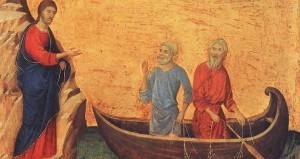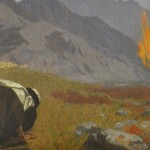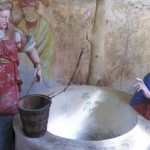 In this morning’s seemingly quiet lesson I see a mountain filled with thunder and lightning and earthquakes, for in this morning’s lesson I see Jesus Christ calling men to Himself to be His disciples: I see the beginning of the New Covenant, and I see Satan fall like lightning from the sky.
In this morning’s seemingly quiet lesson I see a mountain filled with thunder and lightning and earthquakes, for in this morning’s lesson I see Jesus Christ calling men to Himself to be His disciples: I see the beginning of the New Covenant, and I see Satan fall like lightning from the sky.
John presents this heaven and earth and humanity-changing series of events in such simple and humble language that the grand and glorious work of God may at first remain unseen. But here is Jesus Christ, coming to call men to Himself that He might give them life.
I see it in a series of short phrases, some explicitly stated and some implied, found in this morning’s passage.
First, God knows you. God knows who men are before they know who God is or even know who they truly are. He knows you before you were born, and He knows you from before the creation of the heavens and the earth. And He intimately knows you to the point that He knows the number of hairs on your head and has, in fact, calculated the rate at which they are beginning to fall out.
The first time Jesus lays eyes on Peter, He says to him: “You are Simon, the son of Jonah. You shall be called Cephas.” Jesus knows first of all that Simon is Simon, but He also knows that Simon shall be called Cephas, or Peter, a Rock. How does Jesus know this? Of course, He might know because He is the one who will be calling Simon, Cephas. But surely He also knows because He knows not only Simon but also what He will do with Simon, which is to turn him into a Rock.
Jesus also knows Nathanael. “Behold, an Israelite indeed, in whom is no deceit.”
“How do you know me?” Nathanael answers.
Now Nathanael may simply be asking how Jesus knows that Nathanael is Nathanael and appears to talk to him as if He already knows him. But I like to imagine it as if when Jesus says, “Behold, an Israelite indeed, in whom is no deceit” that Nathanael is rather flattered by this description. He thinks to himself, straightening and tightening his tunic (since he wouldn’t have had a tie to do this with), “Well, now that you mention it, I do like to believe that I’m a straight shooter. I guess I am an Israelite in whom there is no deceit.”
Then, turning to Jesus, Nathanael says, “How do you know me?”
But we know the answer to that question, for the answer lies in who Jesus is. How does Jesus know Simon and Nathanael and you? Because He is God Almighty who has come to make a personal visit to you today.
Second, God finds you. The God who knows you also says, “I saw you.” I saw you, Nathanael, even before Philip called you. When you were under the fig tree, I saw you.”
“I saw you, Charles. Even before you were born to your godly parents, I saw you and knew you.”
“I saw you, _________ (fill in your name here). Even before you knew me or loved Me, even when you chose to walk away from Me, I saw you.”
To think that God both knows and sees me! It must also mean that God is concerned about me. He knows me and sees me. He knows that I have tintinnitus in my left ear and a lipoma on my left forearm – and that’s just the exterior of my body.
The God who sees you also finds you. When Jesus wanted to go to Galilee, in verse 43, He found Philip. It might seem like we are the ones who do the finding, so that we say, “We have found the Messiah.” But it is really God who does the finding. After all, we are the lost sheep, we are the spiritually dead corpses, and so God must do the finding. Only after He has found us can we say we have found Him.
Third, when Jesus finds you, He asks you, “What do you seek?” (verse 37). God comes to us in many ways. We have had many introductions to Him and many opportunities to respond. But after God has known us and seen us and found us, He comes to ask you something. He asks, “What do you seek?”
If your answer is riches, then He will send you sadly away, for you cannot serve both God and Mammon. If your answer is self or happiness or leisure, then God might have found you, but you will not find Him.
But if you answer, “I seek the Messiah, the Savior of the world and my soul,” then, fourth, God says, “Come and see” (verse 39). “Come and see where I am living” Jesus says to the two disciples. Jesus invites us into His life, into His home, heaven, saying, “Come and see. Let me show you more of who I am and where and how I live so that you may decide to come and live with Me forever.”
Some, when they see Jesus, want nothing to do with Him because they may have caught a whiff of the Cross. The need to deny self and carry your cross is part of who Jesus is and where He lives, and many want nothing to do with it. You cannot spend time with Jesus Christ and not see His humility and self-emptying and His complete obedience to the will of the Father, and many want nothing to do with it.
Fifth, after we have come and seen Jesus, He invites us to the next stage of discipleship, saying, “Follow me.” Now that we have seen Jesus and know more about Him, it’s time to make a momentous decision. Will we follow Him or continue to follow ourselves?
“If you want to live with Me, then you must trust Me and follow Me wherever I lead you.” Just as the Israelites had to obediently follow the pillar of fire and cloud of light wherever it went, when they were in the wilderness, the disciples of Jesus Christ must follow Him wherever He goes. The original 12 literally played “Follow the Leader” as He continued on His peripatetic ministry.
And He asks us to do the same. Jesus is commanding you today: “Follow Me.” Wherever I lead you today and wherever I lead you tomorrow, you must not fear but faithfully follow. Follow me, for I know where there are green pastures and clean, running water. Follow me, for I know how to protect you from the wolves and from poisons. Follow me, for I will lead to a place of rest.”
Suddenly, one day, after we have chosen a life of following, we wake up to realize we have become a disciple, a follower, of Jesus Christ. But there is one more short truth left.
Sixth, after we have followed and have been caught by Jesus, He asks us to be fishers of men. The One who first said, “Come and see” to us asks us to go and find others. The One we have said we will follow commands us to imitate Him and go find others, saying to them, “Come and see.”
One of John the Baptist’s two disciples who first saw Jesus and was found by Him and who followed Him, Andrew, goes out and finds his brother and brings Him to Jesus. Here is how John puts it, “He first found his own brother Simon and said to him, ‘We have found the Messiah’ (which is translated, the Christ). And he brought him to Jesus.”
This is the picture of how faithful disciples of Jesus Christ evangelize. We, after having faithfully followed, lead others to where Jesus is. Usually, it will be our brother or relative or close friend, for coming and seeing Jesus is an intensely personal, incarnational, relational activity.
Likewise, Philip found Nathanael and said to him, “We have found Him of whom Moses in the law, and also the prophets, wrote – Jesus of Nazareth, the son of Joseph.”
Of course, this is only the beginning because these same disciples go out and make other disciples, who make other disciples, and they tell 2 friends, and they tell 2 friends . . . .
This, then, is life in God’s Kingdom, for those whom God knows and sees and calls and those who seek Him and folllow Him. But this is not just about evangelism. God always knows us and is seeking us. He is always calling to us to know Him and follow Him. He is ever drawing us closer to Him, saying, “Come and see.” And He is ever sending us out to say to others, “Come and see.”
Resolution and Point for Meditation: I resolve to seek to faithfully respond to Jesus Christ in my life today. It may be that I need to know God better, to seek Him more fervently, to spend more time coming and seeing Him in His presence, to more faithfully follow Him in the one thing He is asking you to do today, or to more passionately, immediately, and joyfully go and tell others to “Come and see.”
Prayer: Almighty God, who didst give such grace to thine apostle Andrew that he readily obeyed the call of thy Son Jesus Christ, and brought his brother with him: Give unto us, who are called by thy Word, grace to follow him without delay, and to bring those near to us into his gracious presence; who liveth and reigneth with thee and the Holy Spirit, one God, now and for ever. Amen.
Calling of Peter and Andrew by Duccio di Buoninsegna – U. S. Public Domain












